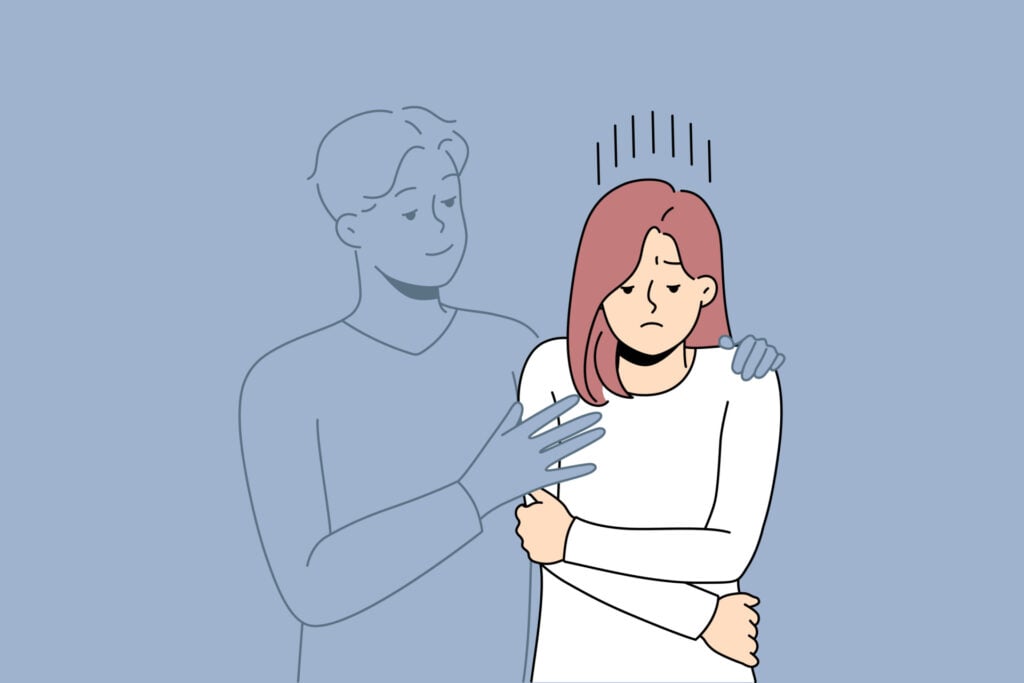On This Page:
Ghosting involves abruptly ending all communication and cutting off all contact with someone without any explanation or warning.
It is most commonly used in modern dating contexts and can occur in various forms of communication, such as text messages, social media, or even in-person interactions.
People who have ghosted someone in the past may decide to come back for a variety of reasons, depending on their individual circumstances and motivations.

A person’s personality traits, attachment style, motivations, relationship status, and life circumstances can all heavily influence why a person who ghosted someone might decide to return.
It’s important to recognize that people are complex and multifaceted, and their actions can be influenced by a combination of internal and external factors.
Some of the reasons a ghoster might return include:
Regrets or Second Thoughts
Regret is a powerful emotion that can lead someone to reassess their past decisions, including the choice to ghost someone. As someone reflects on their actions, they might come to realize that their decision to abruptly cut off contact was hasty or ill-considered.
This introspection can trigger feelings of guilt and remorse, prompting them to consider reaching out again. They might want to apologize and make amends for their actions, or they might be grappling with unresolved feelings about the relationship that they want to address.
The ghoster might also still have feelings for the person they ghosted and want to explore the possibility of a relationship or connection again.
External Motivations
Sometimes, the ghoster might return because they have a specific motive or desire, not a genuine desire to reconnect.
They might be seeking something specific from the person they ghosted, such as advice, a favor, or information, and reaching out is a means to an end.
Or, they might be seeking attention and validation, especially if the person they ghosted responds positively or seems excited to hear from them again. This boost to their self-esteem and ego can be alluring.
Boredom can also lead someone to initiate contact and reconnect with someone from their past. For example, they might randomly send an old photo or reference a shared memory to reminisce or alleviate their current boredom.
Loneliness or Desire to Connect
Loneliness and a yearning for connection can motivate someone to return to a relationship they previously abandoned. They might think that reconnecting with someone from their past, even if they ghosted them, could provide them with companionship or support.
Life changes, such as a breakup or moving to a new place, could trigger a desire for connection, prompting them to reach out. Or, they might be facing challenges in their current relationship that make them reconsider past connections.
Reconnecting with someone they know might provide a sense of familiarity and comfort, particularly during times of stress or uncertainty.
Here are some signs someone is messaging you out of boredom or loneliness:
- Inconsistent communication patterns
- Brief, shallow conversations
- Vague or generic messages
- Lack of initiative
- Disinterest in making future plans
Genuine Intentions
In some cases, ghosters come back with a genuine desire to reconnect. When a ghoster comes back with genuine intentions, it typically signifies that they’ve experienced personal growth, reflection, or a change in circumstances that has led them to reconsider their previous actions.
If a ghoster has worked on themselves, undergone therapy, or experienced personal development, they might be more self-aware and willing to address their past mistakes.
They might have developed a deeper sense of empathy, allowing them to better understand your feelings and the consequences of their actions, which can drive them to make amends.
In some cases, the ghoster might have realized that they had a meaningful connection with you and now want to explore the possibility of a more genuine and lasting relationship.
If they initiate a conversation by acknowledging their past actions, showing vulnerability, and expressing a desire to explain themselves, it’s likely that their intentions are sincere. However, if the person returns without acknowledging their past actions or tries to shift blame onto you, it’s a sign that they might not be taking the situation seriously.
In either case, it’s essential to trust your instincts and prioritize your emotional well-being. If warning signs are present, you should carefully evaluate whether investing your time and emotions in that relationship again is in your best interest.
What Are Common Excuses Ghosters Use?
When someone who has ghosted you decides to reconnect, they might offer various excuses to explain their past behavior. These excuses might be genuine, but in most cases, they are attempts to rationalize their past actions.
Here are some common excuses that ghosters might use:
- “I needed time for myself.”
- “I was overwhelmed by everything going on in my life.”
- “I felt the relationship was moving too fast for me.”
- “My work schedule got really hectic, and I lost track of time.”
- “I thought you weren’t as interested, so I backed off.”
- “I didn’t see your message.”
- “I thought you deserved better.”
- “I thought you weren’t as interested, so I️ distanced myself.”
What Should You Do if a Ghoster Comes Back?
If someone who ghosted you comes back into your life, it’s essential to approach the situation with caution, considering your own feelings, boundaries, and well-being.
Take time to reflect on your feelings about the person who ghosted you and their sudden reappearance in your life. Consider whether you still have unresolved feelings for them or if you’re open to reconnecting.
Reflect on the reasons why they ghosted you in the first place. Have those issues been resolved, and do you believe the person is genuinely committed to not repeating their past behavior?
Pay attention to your gut feelings and intuition. If something feels off or insincere about the person’s approach, trust your instincts and proceed with caution.
However, if the person who ghosted you reaches out and provides a sincere and reasonable explanation for their disappearance, it can be a good opportunity to engage in a conversation to better understand what happened.
Consider whether you want them back in your life:
- Have you felt better since they left?
- Have you missed them?
- Do you think you could trust them again?
- Can you see a future with them?
- Do their values align with yours?
It’s important that you make a decision based on what you want – not because you feel obliged to respond.
If you decide that responding is worthwhile, make sure you:
- Express your own feelings and thoughts
- Set clear boundaries and expectations
- Ask for details if you have questions about what they’ve shared
- Prioritize your own well-being and emotional health
You will be able to tell a lot about their intentions by the way they respond.
Why Do People Ghost?
People ghost for a variety of reasons, and the motivations behind ghosting can vary from person to person.
One of the primary reasons for ghosting is the desire to avoid uncomfortable or confrontational conversations. Some people may find it easier to disappear rather than have difficult discussions.
Another common reason for ghosting is feeling that the relationship was not serious enough to warrant a verbal dissolution. Especially in the context of modern dating, where online dating apps and casual relationships are common, some people view ghosting as an accepted norm for ending short-term connections.
Other people ghost because they fear being rejected or having to reject someone. They may prefer to withdraw from a situation rather than address conflicts or issues directly.
FAQs
Is It More Common for Men or Women to Return After Ghosting Someone?
It’s not necessarily more common for either men or women to return after ghosting someone.
The decision to return after ghosting is highly dependent on personal factors, such as feelings of regret, changes in circumstances, personal growth, or a desire to make amends – these factors can apply to individuals of any gender.
While it has been suggested that women may ghost more frequently due to socialization to people-please and avoid saying “no,” it’s important to note that behavior is influenced by a combination of individual traits, societal norms, personal experiences, and context.
Gender stereotypes and socialization can play a role in shaping behavior, but they are not the sole determinants.
How Long Does It Usually Take a Ghoster to Come Back?
There is no specific timeline or standard duration for when a ghoster might come back, as it can vary widely from person to person and depend on individual circumstances and motivations.
Some people who have ghosted may return after a few days, while others might return after several weeks, months, or even years.
It’s important to remember that there is no set timetable, and the timing of a ghoster’s return should not be the primary focus.
Is It Common for Ghosters to Come Back More Than Once?
Ghosters coming back more than once is not uncommon.
Some individuals may have a pattern of ghosting and reappearing in the lives of others, and they might repeatedly engage in this behavior as a way of handling interpersonal relationships.
Or, if the ghoster’s reasons for ghosting are related to personal issues or emotional challenges, they may experience these issues intermittently, leading to multiple instances of ghosting.
It’s important to recognize that repeated ghosting can be emotionally taxing and unhealthy for the person who experienced it. If you find yourself in a situation where someone is repeatedly ghosting and returning without a clear commitment or valid reasons, it may be wise to seek other relationships.
What Can Happen if You Ignore a Ghoster?
In some cases, ignoring a ghoster may result in them eventually giving up on trying to reconnect as they may interpret your lack of response as a lack of interest and move on.
On the other hand, some ghosters may interpret your silence as a challenge and may persist in their attempts to contact you. They might send more messages or make more significant efforts to get your attention.
This behavior is most commonly seen in highly narcissistic or otherwise toxic individuals as being ignored hurts their ego.
They may start insulting or attacking you (narcissistic rage), beg for you to reply, and try to get your attention in any way they can. The best thing you can do in this scenario is disengage and consider blocking them.
Sources
- Holmes, K. (2022). “Something Would’ve Been Better Than Nothing”: An Analysis of Young Adults’ Stories of Being Ghosted.
- Navarro, R., Larrañaga, E., Yubero, S., & Villora, B. (2020). Psychological correlates of ghosting and breadcrumbing experiences: A preliminary study among adults. International Journal of Environmental Research and Public Health, 17(3).
- Navarro, R., Larrañaga, E., Yubero, S., & Villora, B. (2021). Individual, interpersonal and relationship factors associated with ghosting intention and behaviors in adult relationships: Examining the associations over and above being a recipient of ghosting. Telematics and Informatics, 57.
Julia Simkus edited this article.


